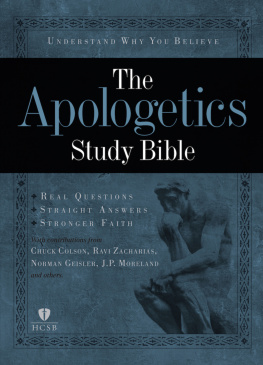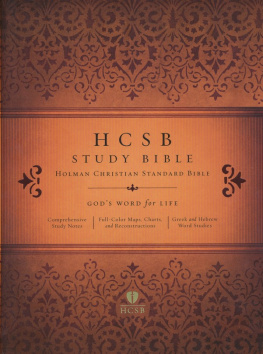C ommonly U sed A bbreviations in the H olman CSB
a.d. in the year of our Lord
alt alternate
a.m. from midnight until noon
Aq Aquila
Aram Aramaic
b.c. before Christ
c. circa
chap chapter
DSS Dead Sea Scrolls
Eng English
Gk Greek
Hb Hebrew
Jer Latin translation of Psalms by Jerome
Lat Latin
Lit Literally
LXX Septuagintan ancient translation of the Old Testament into Greek
MT Masoretic Text
NT New Testament
ms(s) manuscript(s)
OT Old Testament
p.m. from noon until midnight
pl plural
Ps(s) psalm(s)
Sam Samaritan Pentateuch
sg singular
syn. synonym
Sym Symmachus
Syr Syriac
Tg Targum
Theod Theodotian
v., vv. verse, verses
Vg Vulgatean ancient translation of the Bible into Latin
vol(s). volume(s)
Additional Features
W hat I s A pologetics?
by Kenneth D. Boa
Apologetics may be simply defined as the defense of the Christian faith. The simplicity of this definition, however, masks the complexity of the problem of defining apologetics. It turns out that a diversity of approaches has been taken in defining the meaning, scope, and purpose of apologetics.
The word apologetics derives from the Greek word apologia , which was originally used as a speech of defense. In ancient Athens it referred to a defense made in the courtroom as part of the normal judicial procedure. After the accusation, the defendant was allowed to refute the charges with a defense ( apologia ). The classic example of an apologia was Socratess defense against the charge of preaching strange gods, a defense retold by his most famous pupil, Plato, in a dialogue called The Apology .
The word apologia appears 17 times in noun or verb form in the NT, and can be translated defense or vindication in every case. The idea of offering a reasoned defense of the faith is evident in Php 1:7,16; and especially 1 Pt 3:15, but no specific theory of apologetics is outlined in the NT.
In the second century this general word for defense began taking on a narrower sense to refer to a group of writers who defended the beliefs and practices of Christianity against various attacks. These men were known the apologists because of the titles of some of their treatises, but apparently not until 1794 was apologetics used to designate a specific theological discipline.
It has become customary to use the term apology to refer to a specific effort or work in defense of the faith. An apology might be a written document, a speech, or even a film. Apologists develop their defenses of the Christian faith in relation to scientific, historical, philosophical, ethical, religious, theological, or cultural issues.
We may distinguish four functions of apologetics, though not everyone agrees that apologetics involves all four. Such opinions notwithstanding, all four functions have historically been important in apologetics, and each has been championed by great Christian apologists throughout church history.
The first function may be called vindication or proof , and involves marshaling philosophical arguments as well as scientific and historical evidences for the Christian faith. The goal of this function is to develop a positive case for Christianity as a belief system that should be accepted. Philosophically, this means drawing out the logical implications of the Christian worldview so that they can be clearly seen and contrasted with alternate worldviews.
The second function is defense . This function is closest to the NT and early Christian use of the word apologia, defending Christianity against the plethora of attacks made against it in every generation by critics of varying belief systems. This function involves clarifying the Christian position in light of misunderstandings and misrepresentations; answering objections, criticisms, or questions from non-Christians; and in general clearing away any intellectual difficulties that nonbelievers claim stand in the way of their coming to faith.
The third function is refutation of opposing beliefs. This function focuses on answering the arguments non-Christians give in support of their own beliefs. Most apologists agree that refutation cannot stand alone, since proving a non-Christian religion or philosophy to be false does not prove that Christianity is true. Nevertheless, it is an essential function of apologetics.
The fourth function is persuasion . By this we do not mean merely convincing people that Christianity is true, but persuading them to apply its truth to their life. This function focuses on bringing non-Christians to the point of commitment. The apologists intent is not merely to win an intellectual argument, but to persuade people to commit their lives and eternal futures into the trust of the Son of God who died for them.
B ooks of the B ible and C ontributors
Old Testament
Genesis
Introduction: Kenneth A. Mathews
Notes: Chapters 111: Kenneth A. Mathews
Chapters 1250: A. Boyd Luter Jr.
Exodus
Introduction and Notes: Robert D. Bergen
Leviticus
Introduction and Notes: Mark F. Rooker
Numbers
Introduction and Notes: R. Dennis Cole
Deuteronomy
Introduction and Notes: Eugene H. Merrill
Joshua
Introduction and Notes: Ken Fentress
Judges
Introduction and Notes: Barry C. Davis
Ruth
Introduction and Notes: Barry C. Davis
1 Samuel
Introduction and Notes: Robert D. Bergen
2 Samuel
Introduction and Notes: Robert D. Bergen
1 Kings
Introduction and Notes: Kirk E. Lowery
2 Kings
Introduction and Notes: Kirk E. Lowery
1 Chronicles
Introduction and Notes: Kirk E. Lowery
2 Chronicles
Introduction and Notes: Kirk E. Lowery
Ezra
Introduction and Notes: Barrett Duke
Nehemiah
Introduction and Notes: Barrett Duke
Esther
Introduction and Notes: Barrett Duke
Job
Introduction and Notes: Richard D. Patterson
Psalms (s)
Introduction and Notes: Allen P. Ross
Proverbs
Introduction and Notes: Edward M. Curtis
Ecclesiastes
Introduction and Notes: Duane A. Garrett
Song of Songs
Introduction and Notes: Sheri L. Klouda
Isaiah
Introduction and Notes: Gary Smith
Jeremiah
Introduction and Notes: David K. Stabnow
Lamentations
Introduction and Notes: David K. Stabnow
Ezekiel
Introduction and Notes: Lamar E. Cooper, Sr.
Daniel
Introduction and Notes: Stephen R. Miller
Hosea
Introduction and Notes: Thomas J. Finley
Joel
Introduction and Notes: Thomas J. Finley
Amos
Introduction and Notes: Thomas J. Finley
Obadiah
Introduction and Notes: Thomas J. Finley
Jonah
Introduction and Notes: Thomas J. Finley
Micah
Introduction and Notes: Thomas J. Finley
Nahum
Introduction and Notes: Thomas J. Finley
Habakkuk
Introduction and Notes: Thomas J. Finley
Zephaniah
Introduction and Notes: Thomas J. Finley
Haggai
Introduction and Notes: Thomas J. Finley
Zechariah
Introduction and Notes: Thomas J. Finley
Malachi
Introduction and Notes: Thomas J. Finley
New Testament
Matthew
Introduction and Notes: Alan Hultberg
Mark
Introduction and Notes: Alan Hultberg
Luke
Introduction and Notes: Alan Hultberg
John
Next page











